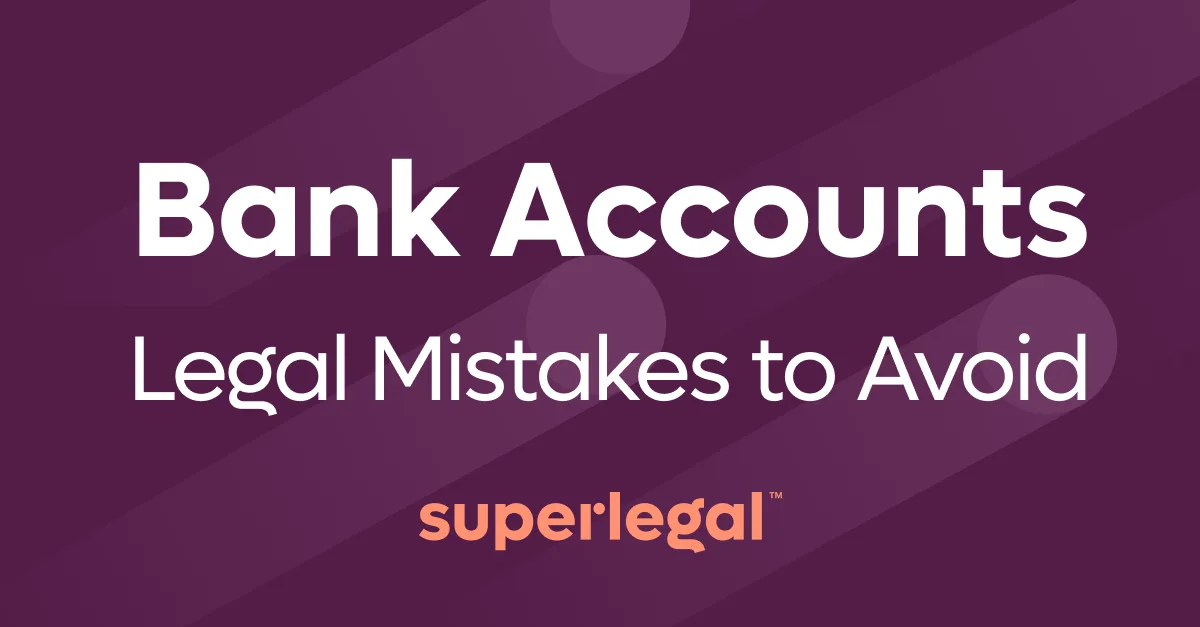The sudden collapse of Silicon Valley Bank is causing shockwaves around the world.

Just days ago, the start-up lender became the largest bank to fail since the 2008 financial crisis.
Tech companies throughout the world are scrambling to figure out how to manage their finances after the bank came crashing down on Friday.
The brutal collapse has left global markets in turmoil, billions of dollars stranded and the threat of a widespread financial crash looming.
Whilst you can’t predict the long term viability of a bank’s investment decisions – there are things you can control when it comes to choosing and signing up with a new bank.
We’re here to guide you through the legal process of opening a bank account for your tech company.
So you have the guidance you need when it comes to the all important decision of where to safely store your company’s money!
In this blog post, we will talk about:
- How to choose the right bank for your business
- The legal agreements involved in opening a bank account
- Five legal mistakes to avoid when opening a bank account
Choosing the right bank
Choosing the right bank is crucial for the financial health and success of your business.
The bank collapse serves as a stark reminder of the importance of carefully considering the financial health, stability, reliability and trustworthiness of any bank you choose to trust with your company’s money.

In light of the Silicon Valley Bank collapse, it is crucial for tech companies to do seriously robust due diligence:
– researching and comparing different banks
– seeking advice from legal and financial experts
– carefully reviewing your contractual obligations with the bank
It is essential to research the bank’s legal standing, including its compliance with regulatory requirements and its financial stability.
We’ll talk about this in more detail later on.
PRO TIP: Consider going with a larger and more established bank with a more diverse range of commercial customers in order to limit the risk of bank collapse!
Legal Agreements Involved in Opening a Bank Account
When opening a bank account, the legal agreements you will be required to sign:
-establish the legal relationship between you and the bank
-define the terms and conditions of the account
-set out the obligations you will be on the hook for
These agreements can be complex and have significant implications for your business, so it’s important to review every single one and approach them with the utmost care and attention.
PRO TIP: You may not realize, but many of the terms in bank agreements are negotiable, so feel free to negotiate terms in your favor – with consideration, tact and within reason, of course!

Account Terms and Conditions
The account terms and conditions outline the terms of the account, including the minimum balance requirements, interest rates, fees, and charges.
This is the most important contract you will sign – as these terms will impact the day to day financial operation of your business.
So it’s essential to read and understand these terms before opening an account to avoid any surprises later on!
Pay special attention to the following types of fees when considering signing up to a new bank:
- Maintenance fees on checking accounts: Some banks waive these fees if you meet certain minimum balance requirements each month. These minimum requirements vary widely by financial institutions.
- Transaction fees: These fees may apply if you exceed a maximum number of transactions per month. They may not apply to small businesses with low transaction volumes, but keep in mind that as your business grows, these fees may come into play.
- ATM fees: Many banks charge a fee if you withdraw funds from other institutions’ ATMs.
- Deposit fees: You may pay extra if you exceed a set limit on the amount of money or number of deposits you complete each month.
- Early-termination fees: Some account terms include a fee if you close your account before a certain contractual period ends – so go through your contracts with a fine tooth comb so you don’t miss key clauses like this!
Some banks may charge hidden fees for certain services, so be sure to ask about any fees that may not be clearly outlined in the agreement.
If you’re only just starting out, banks may be willing to provide you with an excellent low or no-fee checking account, business support products and specific services geared toward startups. So look out for these!
Electronic Banking Agreement
An electronic banking agreement governs the use of online banking services and establishes the terms and conditions of these services.
You should review the types of services offered, such as bill pay, fund transfers and account monitoring. Review the fees associated with these services as well as any limits on transactions or transfers.
Overdraft Agreement
An overdraft agreement outlines the terms and conditions of overdraft protection, including the associated fees, charges and interest charged on the overdraft amount.
Make sure you understand the bank’s policies on how overdrafts are handled, such as whether the bank will automatically cover overdrafts or require your business to opt-in to the service.
Wire transfer agreement
If your business plans to make or receive wire transfers, you may need to sign a wire transfer agreement that outlines the terms and conditions of the service.
Make sure to review the fees associated with wire transfers, as well as any limits on the amount of money that can be transferred.
You need to understand the bank’s policies on how wire transfers are handled, such as how long it takes for transfers to be processed and the security measures put in place by the bank to prevent fraud.

Merchant services agreement
If you accept credit card payments from your customers, you will need to sign a merchant services agreement with the bank.
Third-party processors offer this service (and usually have lower rates), but it may be more convenient and efficient to use a bank.
Find out if the bank you’re considering offers merchant processing services and whether the terms and rates are better than those of third-party providers.
Cardholder agreement
If the account includes a debit or credit card, you will have to sign a cardholder agreement that outlines the terms and conditions of the card’s use.
Along with a business checking account, you should have a business credit card account for business purchases.
Interest rates and other credit card terms vary, so shop around.
Consider establishing a business line of credit (a source of funds you can access on an as-needed basis) or securing a small business loan as well.
Doing so may be easier at the bank where you have a business checking account, since it already has access to much of the documentation needed when applying for a loan.
5 Legal Mistakes to Avoid When Opening a Bank Account
Making legal mistakes when signing up to a new bank can be costly and damaging to your company’s financial health and long term operation.
Here are five mistakes you need to avoid when signing up to a new bank:

1. Not Reading the Fine Print
When opening a bank account, it’s essential to read the terms and conditions thoroughly before signing any agreement.
Failing to read the fine print could result in hidden fees, unexpected charges, or unfavorable terms that could harm your company’s future!
Make sure to review all legal agreements involved in opening a bank account and seek legal advice if necessary.
2. Not Understanding Regulatory Compliance
Banks are subject to various regulations, including anti-money laundering laws, consumer protection laws and data protection laws.
Not understanding regulatory compliance can result in significant legal and financial consequences.
In light of the collapse of Silicon Valley Bank, a bank doesn’t have to be in violation of rules and regulations in order to crash.
They can simply make bad investment choices!
So whilst you can’t predict the future, it’s critical for you to do thorough and robust due diligence at the outset, so that you can make as informed a decision as possible.
Ensure that the bank you choose to keep your company’s money safe is compliant with all relevant regulations to avoid any legal or financial issues down the line.
3. Not Establishing a Clear Dispute Resolution Process
Disputes between you and the bank may arise, such as disputes over fees or unauthorized transactions.
Failing to establish a clear dispute resolution process with your bank can result in significant and unforeseen legal and financial consequences.
You need to ensure that you understand the bank’s dispute resolution process:
-location of governing law (this determines the state whose laws are applicable to the contract and location of any legal proceedings)
-the process for alternative dispute resolution such as mediation and arbitration
Know your legal rights in the circumstances of a breach in order to minimize nasty surprises down the line!
4. Not Considering the Impact of Overdraft Agreements
Overdraft agreements can be tempting, but can lead to costly fees and charges.
These fees can really add up – so you need to understand the bank’s policy on overdrafts and opt out if necessary!
Ensure that you understand the terms and conditions of any overdraft agreement before signing and consider avoiding overdraft agreements altogether to avoid unnecessary fees and charges.
5. Not Considering the Impact of Power of Attorney Agreements
If you plan to grant someone else the authority to access your company’s bank account, a power of attorney agreement will be required.
But granting this power to access your bank account can be risky.
A PoA outlines the scope of authority granted to the individual and any limitations on that authority.
Make sure to establish clear limitations and guidelines for any power of attorney agreement you sign – failure to do so could result in significant legal and financial consequences.
Conclusion
The terms you sign with the bank are as important as the choice of bank itself.
Your business will be liable for any and all breaches of the terms you sign.
So take the time to carefully review all the agreements and ensure that you are making the best decision for your business.

It’s important to keep copies of all legal agreements you sign with your bank for future reference and regularly review your agreements to ensure that they still meet your company’s needs.
And don’t rush!
By taking the time to understand these legal agreements and seek legal advice when necessary, you will put your company in the best position (financial crises aside) to manage your finances effectively and avoid legal and financial pitfalls that are in your control.
So I think you get the message – failing to review each and every agreement you sign can lead to missed details and misunderstandings that could impact your company further down the line.
At Superlegal, we’re experts in reviewing and negotiating contracts.
Our award-winning AI, verified by our team of top commercial lawyers, put your business needs first and take care of your legal risk for ultimate peace of mind.
With Superlegal you’ll get your contracts back within 24 hours, all whilst saving up to 90% on your legal costs.
In an increasingly uncertain world, Superlegal is something you can rely on.
Sign up to our Free Trial and get your 1st contract reviewed for free!








By entering your email, you agree to our Terms & Conditions and Privacy Policy.